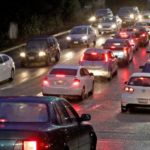 When ride-sharing companies, such as Uber, enter a city, the concern is often about things such as jobs and congestion. New research from Carnegie Mellon reminds us, however, that their arrival can also have an impact on car registrations. The study suggests that the arrival of ridesharing firms coincides with a 0.7% rise in vehicle registrations, with this number higher in areas with a high car dependency.
When ride-sharing companies, such as Uber, enter a city, the concern is often about things such as jobs and congestion. New research from Carnegie Mellon reminds us, however, that their arrival can also have an impact on car registrations. The study suggests that the arrival of ridesharing firms coincides with a 0.7% rise in vehicle registrations, with this number higher in areas with a high car dependency.
The findings, which emerged after analysis of data from a number of major American cities from 2011 to 2017 also showed that ridesharing firms displace public transit more in cities with fewer children and higher income.
“I would have expected people to own fewer vehicles once they gain access to this alternative transportation mode,” the co-author of the paper says. “But that’s not what we see in the data. One possible explanation could be that there’s an effect on the other side, where somebody who was on the verge of being able to afford a vehicle now has an incentive to buy one and earn some money with it. So vehicle adoption by Uber and Lyft drivers may outweigh the effect of riders getting rid of their personal vehicles.”
Changing mobility
The researchers also examined the impact of ridesharing services on public transport usage and found that while the impact wasn’t substantial, there was nonetheless a fall in transit use in cities with higher incomes.
“What this suggests to me is that in a city where people have disposable income and fewer children, they don’t mind paying more for a more convenient mode of transportation, and they don’t have to worry about logistics like bringing a car seat,” the researchers say.
The researchers note that their analysis only covers the period before the Covid-19 pandemic, and accept that the patterns they observe will almost certainly have changed as a result.
“Of course, the pandemic has caused enormous changes in ridesourcing, public transit, and transportation trends in general. With many employees working from home, and many others opting to use personal vehicles for travel, ridesourcing services have seen a drop in riders,” they note. “The question is, once the pandemic is behind us, do we return to the kinds of travel patterns and choices we saw before the pandemic, or are there systemic changes that won’t go back to normal because people have permanently changed their behavior? We won’t know for sure until it happens.”